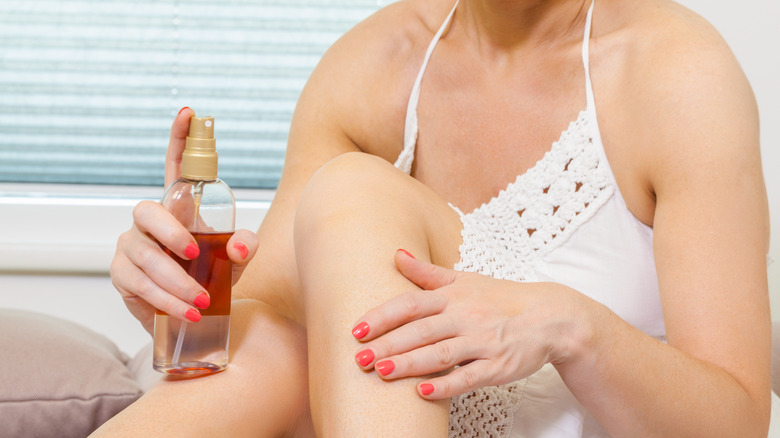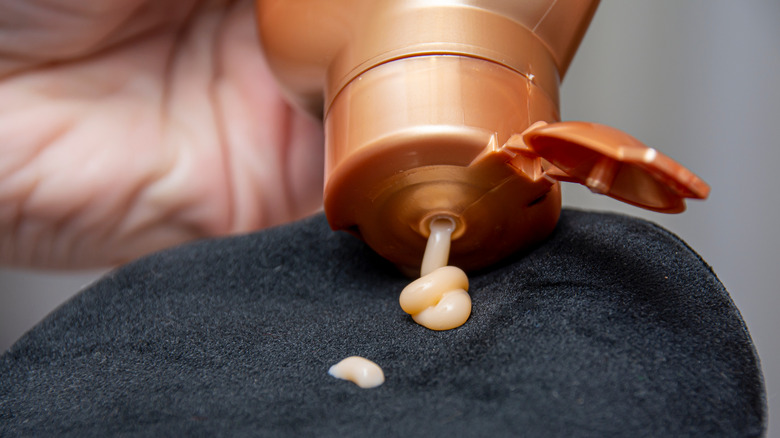Are Self-Tanners Actually Safe For Your Skin?
Self-tanners can help you get that healthy summer glow without exposing your skin to sunlight, but are they safe? The answer depends on who you ask. "Tanning lotions and sprays are safer alternatives than tanning, whether indoors or out," says Adam Ingraffea, a dermatologist at the University of Cincinnati. However, these products can still pose health risks, depending on their composition.
We all know that tanning is bad for the skin. It not only accelerates aging but also causes DNA damage, which may lead to skin cancer. In some cases, it can also increase the risk of developing cataracts and suppress immune function. Given these aspects, many dermatologists recommend wearing sunscreen indoors to protect our skin from ultraviolet (UV) radiation.
Self-tanning lotions may seem safer, but that's not always the case. As it turns out, these products may contain toxic ingredients and cause just as much harm as sunlight exposure.
Some self-tanners can speed up aging and cause toxicity
Sunless tanning products contain dihydroxyacetone (DHA), a plant-derived sugar molecule that penetrates the upper layer of your skin. This compound can gradually create the appearance of a tan without the need for sun exposure. Its concentration may vary from 2.5% to 10%, depending on the type of product. The higher the percentage of DHA, the darker the tan will be. But like other skincare ingredients, DHA isn't entirely safe and can have serious side effects.
Some people are sensitive to this sugar and may experience rashes, dizziness, or contact dermatitis, according to 2018 research published in the Journal of the Dermatology Nurses' Association. Moreover, DHA can increase skin sensitivity to sunlight, thicken the skin's outer layer, or cause dryness. Some studies even suggest that it can lead to DNA damage and cancer.
"DHA has been shown to cause an increase in free radicals in the skin," said dermatologist Chere Lucas Anthony in an interview with Consumer Reports. "This can contribute to skin aging as the free radicals break down collagen and elastin in the skin, which leads to wrinkling and skin aging," she added. On the other hand, cosmetic chemist Michelle Wong told Consumer Reports that DHA doesn't penetrate the deep layers of the skin, so its impact is negligible. But even so, there's a risk of allergic reactions and adverse effects.
Should you stop using self-tanners?
Using a self-tanner on your skin can be harmful, even if you choose a DHA-free formula. The parabens, fragrances, and other chemicals in these products may be toxic, too. For example, some formulas contain mineral oil, which can clog your pores and cause breakouts, rashes, or other local reactions. Make sure you also check the label for parabens, a class of estrogen-like compounds that can mess up your hormones and increase cancer risk. Synthetic dyes, such as Blue 1 and Red 40, are not safer either.
However, not all self-tanners are created equal. Your best bet is to choose an organic DHA-free formula, such as the Glimmer Goddess Organic Bronzer Body Lotion. Generally, DHA-free self-tanners contain erythrulose or other non-toxic compounds. Another option is to make a DIY self-tanner with pantry staples like cocoa powder, brown sugar, vanilla extract, or coffee. You'll also need a fragrance-free body lotion or cream to bind the ingredients together.
Consider your lifestyle, too. If you only use self-tanners occasionally, you shouldn't experience any issues. Just remember to do a patch test beforehand to rule out allergic reactions. An even better option is to use makeup to give your skin a sun-kissed glow. Simply apply a bronzing powder to your face, chest, arms, legs, and other exposed areas.

